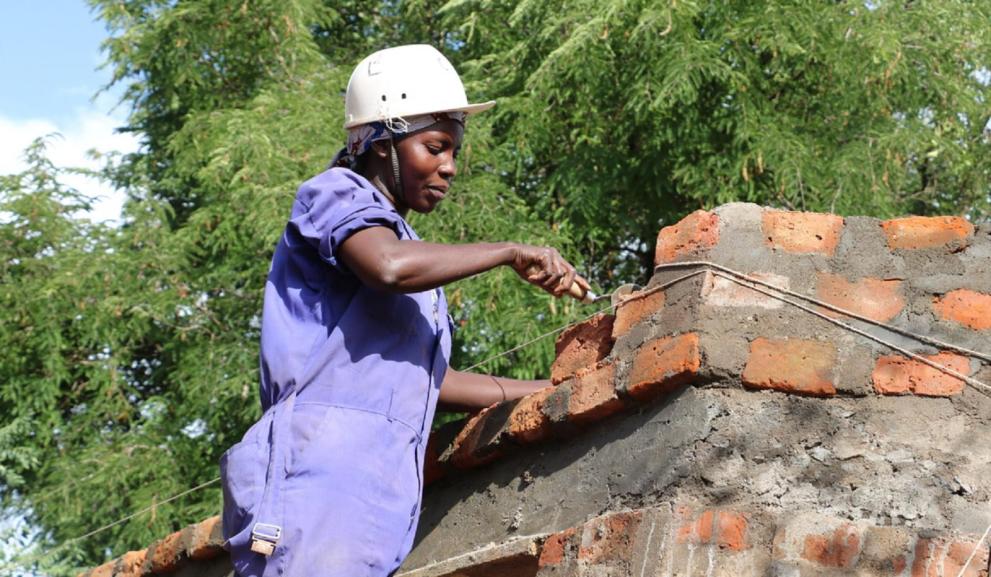
“When I graduate, the first thing I am going to do is build a house for my parents” says 22 year old Lenia. Working among a group of boys, all dressed in overalls and helmets, she does, at first, not stand out. She is fitting mortar, a mixture of sand and cement, between two bricks. This is the last line of bricks for the house that is being built by trainees of the Bricklaying and Concrete Practice course at Siripi Youth Skills Centre in Rhino Camp Refugee Settlement (Northern Uganda). It is only when you see the braids escaping through the sides of her helmet that you decide to take a closer look and see that she is a woman – a rare sight in this class.
Most girls chose tailoring or catering. However, “we encourage them to join male-dominated trades like carpentry, construction and welding,” Tito Geoffrey Droma, Principal of the youth skills training centre at Siripi, explains. “There is nothing a man can do that a woman cannot”, he adds.
Eagerly building her future, from an early age on
Lenia grew up with her parents, who are farmers in a village in Arua district, Northern Uganda. When she completed primary education, she was sent to a nearby town to attend secondary school, where she stayed with her aunt. During the school holidays and, as her family did not have enough money, Lenia would lay bricks to buy school supplies, such as pens and books. Still, she had to drop out after failing exams in lower secondary school.
“I was ready to repeat the class, to try to get a better grade, but my parents could no longer pay my school fees”, she says. While at home pondering what to do with her life, Lenia heard about the skills training opportunity at Siripi and enrolled.
An inspiration for women, but also for men
“Women may think that they cannot do bricklaying and concrete practice but if they see a fellow woman doing it, they will think again. Lenia is becoming a source of inspiration to other women,” Droma says. He adds that Lenia is also inspiring men to look at women in a different light. Derrick, for example, a refugee from South Sudan, who is now working side-by-side with Lenia, says he was at first surprised to see her and did not think she would last a week. But she proved him wrong. There is nothing Lenia cannot do – she can mix mortar, push a wheelbarrow full of bricks, scale buildings and much more.
“We do not give anyone exceptional treatment or accept bullying. All the trainees are encouraged to live together as one, without drawing attention to differences in gender, nationality or even tribe,” Droma adds.
Lenia’s training is almost coming to an end. Afterwards, she will have an internship to try out her skills in a practical environment. “I have learned everything I need to build a house,” she says. And that’s she will do: build a house for her parents.
The training will not only enable Lenia to show gratitude to her family but has also set her on a course of self-reliance, as during her training she also learned about entrepreneurial skills and can build her own job and future.
Background
As a Ugandan living in Rhino Camp refugee settlement, Lenia is one of many members of the local community benefiting from the Support Programme for Refugee Settlements and Host Communities in Northern Uganda (SPRS-NU), funded by the European Union Trust Fund. The programme is designed to benefit 70% of the refugees and 30% nationals, adhering to the Refugee and Host Population Empowerment (ReHoPE) strategy and supporting the objectives of the Comprehensive Refugee Response Framework (CRRF) which Uganda has bene piloting. This model promotes peaceful co-existence between refugees and host communities by ensuring that both are supported.
Siripi Youth Skills Centre, run by Welthungerhilfe in Rhino Camp Refugee Settlement, received funding from Enabel through SPRS-NU to equip 300 youth, including women and girls, with employable skills that would help improve their livelihoods. The centre is one of five that Enabel signed agreements with to train both refugee and host communities.
Details
- Publication date
- 17 September 2018
- Region and Country
- Uganda
- Thematic
- Greater economic and employment opportunities
- Partner
- ENABEL - Belgian Development Agency
